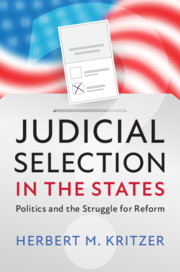Book contents
- Judicial Selection in the States
- Judicial Selection in the States
- Copyright page
- Dedication
- Contents
- Figures
- Tables
- Preface
- Table of Cases
- 1 Introduction
- Part I Change as an Exercise in Partisan Politics
- Part II Change as Court Modernization or Good Government
- Part III Unsuccessful Change Efforts
- 11 Florida and South Dakota
- 12 Nevada and Ohio
- 13 Minnesota, Pennsylvania, Texas, and New Hampshire
- 14 Missouri, Kansas, and Oklahoma
- 15 Conclusion
- Index
15 - Conclusion
What Do We Want in Our Judges?
from Part III - Unsuccessful Change Efforts
Published online by Cambridge University Press: 06 April 2020
- Judicial Selection in the States
- Judicial Selection in the States
- Copyright page
- Dedication
- Contents
- Figures
- Tables
- Preface
- Table of Cases
- 1 Introduction
- Part I Change as an Exercise in Partisan Politics
- Part II Change as Court Modernization or Good Government
- Part III Unsuccessful Change Efforts
- 11 Florida and South Dakota
- 12 Nevada and Ohio
- 13 Minnesota, Pennsylvania, Texas, and New Hampshire
- 14 Missouri, Kansas, and Oklahoma
- 15 Conclusion
- Index
Summary
The conclusion briefly summarizes the results, including a table that lists each state covered and assesses the relative importance of politics/policy versus professionalism in each. There has been a temporal change in the central motivation for change efforts: a shift around 2000 from primary emphasis professionalism to politics/policy. Two other important patterns are also discussed, First, the preference for a more political/policy-driven approach to judicial selection used to be associated with the political left but is increasingly coming from the right side of the political spectrum; two possible explanations for this change are discussed. The second pattern the greater willingness of citizens to surrender their role in contested judicial elections for appellate courts than for local trial courts. To explore this latter point, a short survey was conducted asking respondents to rate the importance of characteristics to be considered in selecting judges. Legal professionalism characteristics tended to be rated as more important than political characteristics, and this was particularly true for state supreme court justices as compared to local trial judges.
Keywords
- Type
- Chapter
- Information
- Judicial Selection in the StatesPolitics and the Struggle for Reform, pp. 344 - 370Publisher: Cambridge University PressPrint publication year: 2020



